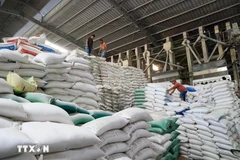 Effective supply chain planning is the key to unlocking operational excellence and driving business success. (Photo: VNA)
Effective supply chain planning is the key to unlocking operational excellence and driving business success. (Photo: VNA) The specialists in demand and supply chain management in emergingmarkets conducted an industry survey on supply chain planning to uncovervaluable insights and address the challenges faced by businesses in thiscritical area.
The results shed light on the current state of supply chainplanning practices and provided a road map for organisations to enhance theirplanning capabilities.
The survey across industries and regions captured responses fromsupply chain professionals, decision-makers and industry experts.
It found that, on average, companies spend 41% of total planningtime on data preparation, underlining the need for efficient tools andprocesses to streamline this process.
When it comes to technology tools and platforms, 30% of companiesuse dedicated planning software, while 35% still rely on Excelspreadsheets, showing the importance of adopting advanced planning technologiesto enhance accuracy, collaboration, and overall planning effectiveness.
Over 44% of respondents identified demand unpredictability asthe most challenging aspect of supply chain planning. This underscores the needfor robust demand management practices and the incorporation of real-time datato improve forecasting accuracy.
Some 16.7% of companies do not integrate finance into theirplanning process, representing a missed opportunity to align financial goalsand objectives with supply chain planning efforts.
In terms of satisfaction with planning tools, 67% expresseddissatisfaction with what they currently have, indicating significant room forimprovement in technology solutions to meet the evolving needs of supply chainprofessionals.
Julien Brun, founder and managing partner at CEL, commenting onthese survey findings, pointed to the critical role of effective supply chainplanning in today's competitive landscape.
"Effective supply chain planning is the key to unlockingoperational excellence and driving business success. Studies have shown thatcompanies with robust supply chain planning processes experience an averagecost reduction of 15% and an inventory reduction of 20-30%.
“Additionally, they achieve an impressive 99% on-timedelivery rate and a 20% increase in customer satisfaction. By investing inoptimised supply chain planning, organisations can maximise efficiency, costs,and deliver exceptional value to their customers."/.



























